#toni cade bambara
Text
Poor people, people of color, Indigenous people, queer people, and women receive the least benefit from the nuclear complex and are most exposed to its harm: the most toxic nuclear technology sites are located on Indigenous land and in proximity to poor communities and communities of color; predominantly Black cities are established as nuclear bait to protect the white suburbs, with the result that by 1984, an estimated 88 percent of the African American population would have been wiped out in the first minutes of a full-scale atomic conflict; safety standards regulating exposure to radiation are established based on the male body when women exposed to the same sources are 37.5 percent more likely to develop cancer; homosexuals are purged from the government at twice the rate of communists as the security of the nuclear complex is perceived to be threatened by their vulnerability to blackmail. As the activist Jan in Toni Cade Bambara’s The Salt Eaters (1980) argues to a friend who semijokingly wants to keep the struggle focused on “good ole-fashioned” racism, “They’re connected. Whose community do you think they ship radioactive waste through, or dig up waste burial grounds near? Who do you think they hire for the dangerous dirty work at those plants? What parts of the world do they test-blast in? And all them illegal uranium mines dug up on Navajo turf—the crops dying, the sheep dying, the horses, water, cancer, Ruby, cancer. And the plant on the Harlem River.... Hell, it’s an emergency situation, has been for years. All those thrown-together plants they built in the forties and fifties are falling apart now. War is not the threat. It’s all the ‘peacetime’ construction that’s wiping us out.”
Jessica Hurley, Infrastructures of Apocalypse: American Literature and the Nuclear Complex (University of Minnesota Press, 2020), pp. 14–15.
68 notes
·
View notes
Text
I do not think literature is the primary instrument for social transformation, but I do think it has its potency. So I work to tell the truth about people’s lives; I work to celebrate struggle, to applaud the tradition of struggle in our community… like the fact that the simple act of cornrowing one’s hair is radical in a society that defines beauty as blonde tresses blowing in the wind;
…
It would be dishonest, though, to end my comments there. First and foremost, I write for myself. Writing has been for a long time my major tool for self-instruction and self-development. I try to stay honest through pencil and paper. I run off at the mouth a lot. I’ve a penchant for flambyoant perforance. I exaggerate to the point of hysteria. I cannot always be trusted with my mouth open. But when I sit down with the notebooks, I am absolutely serious about what I see, sense, know. I write for the same reason I keep track of my dreams, for the same reason I meditate and practice being still— to stay in touch with me and not let too much slip by me. We’re about building a nation; the inner nation needs building, too.
…
I began writing in a serious way… when I got into teaching. It was a way to keep track of myself, to monitor myself. I’m a very seductive teacher, persuasive, infectious, overwhelming, irresistible. I worked hard in the classroom to teach students to critique me constantly, to protect themselves from my nonsense; but let’s face it, the teacher-student relationship we’ve been trained with is very colonial in nature. It’s fraught with dangers. The power given to teachers over students’ minds, students’ spirits, students’ development— my God! To rise above that, to insist of myself and of them that we refashion that relationship along progressive lines demanded a great deal of courage, imagination, energy, and will. Writing was a way to “hear” myself, check myself. Writing was/is an act of discovery.”
excerpts from Conversations with Toni Cade Bambara, TCB responds to the question, “What determines your responsibility to yourself and your audience?” posed in an interview by Claudia Tate, 1983
25 notes
·
View notes
Text
“Are you sure, sweetheart, that you want to be well?… Just so’s you’re sure, sweetheart, and ready to be healed, cause wholeness is no trifling matter.”
— Toni Cade Bambara, The Salt Eaters
10 notes
·
View notes
Text
“Keep the focus on the action not the institution; don’t confuse the vehicle with the objective; all cocoons are temporary and disappear.”
-- Toni Cade Bambara, from The Salt Eaters
13 notes
·
View notes
Text
CURRENTLY READING :
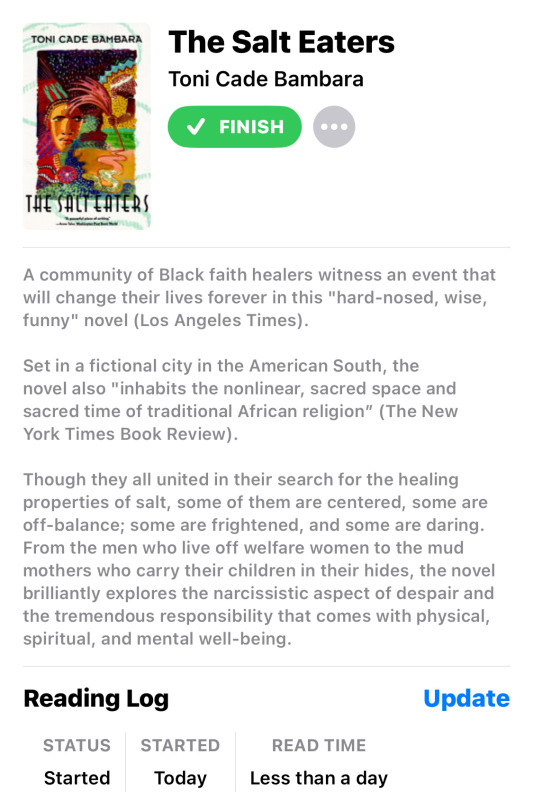
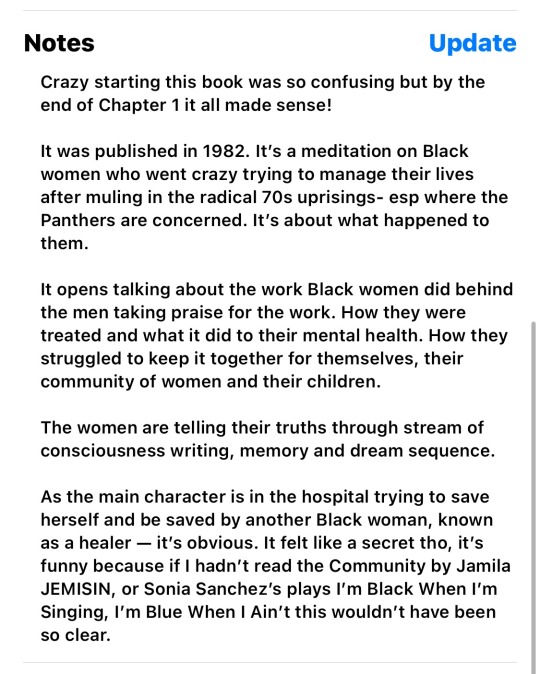
So it’s my day off and I’m chilling out as I usually do me and my baby laying in the bed my baby I mean Doggo and I’m just getting into the salt eaters. I’ve always wanted to really jump into Toni Cade Bambara’s work but I couldn’t find my footing. I realize now that it was because when I had attempted to read the book before it wasn’t making sense to me I went on Goodreads just to check out what some folks were saying about it and they agree that it was hard to navigate.
However, now I realize that I needed to read some other things to become more informed and those books lent clarity to this one. I wrote a couple notes in my favourite reading tracker app about what I was experiencing after I read chapter 1 and I actually wanna go back and start all over again because it was just so next level by the end of the time that I got to chapter 1 I was like holy shit. I might start all over. Anyway, just wanted to share.
#chantel’s reading diary#toni cade bambara#chantel’s reading notes#currently reading#goodreads#reading notes
3 notes
·
View notes
Quote
Outside in the yard that doubled as a parking lot and general hangout, the motorcycle club was gathering. Leather pants, jackets, silver studs spelling out names and threats, crushed hats or helmets, gloves, men straddling bikes or standing around profiling, the women seated waiting. Obie eyed the women sitting with their backs to the window, their asses splayed out on the black leather seats or leopard-skin seat covers, or held from spreading by thick denim or tight leather; their backs arched as they held on to fenders behind them; their backs bent as they leaned forward grabbing at the ape-hangers. Women. Women talking in bits and pieces, mostly waiting, mostly impatient waiting, waiting for the men to straddle the machines and turn on the power and take them somewhere.
from The Salt Eaters by Toni Cade Bambara
22 notes
·
View notes
Text
"The role of the artist is to make the revolution irresistible" - Toni Cade Bambara
5 notes
·
View notes
Text
"What underlies my work as I read it—and I suspect it is what keeps my “children’s” stories from being insufferably coy, cute, and sentimental—are the basic givens from which I proceed. One, we are at war. Two, the natural response to oppression is resistance. Three, the natural response to stress and crisis is not breakdown and capitulation, but transformation and renewal."
-Toni Cade Bambara, "Moaning Pitched High Enough Sounds Like Laughing"
10 notes
·
View notes
Text
"In 1980, a couple of years before leaving Random House to write full time, [Toni Morrison] received a letter from Toni Cade Bambara describing her progress on what would become The Salt Eaters. Bambara wrote: “I more fully appreciate a comment you made/often make about you and writing and time, etc. The short story is a piece of work. The novel is a way of life. It’s devastating. How the hell do you do it, Lady? Stunning. (You are, I mean).”
#on writers#on writing#remember#angela davis#toni morrison#toni cade bambara#women writers#applies to a03 writers too#doing top tier work all of you
5 notes
·
View notes
Photo
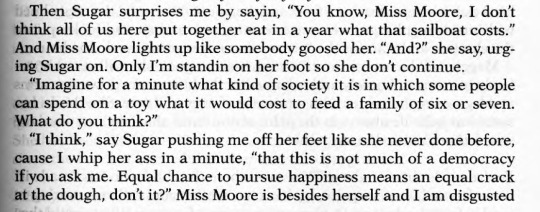

Toni Cade Bambara, The Lesson
2 notes
·
View notes
Text
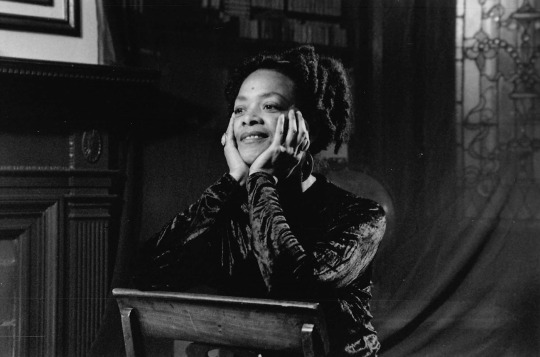
Toni Cade Bambara, March 25, 1939 / 2024
(image: «Toni [Cade Bambara] on W. E. B. Du Bois film set, Philadelphia, 1995, Carlton Jones, photographer for the W. E. B. Du Bois Film Project (© Scribe Video Center)», in Savoring the Salt. The Legacy of Toni Cade Bambara, Edited by Linda Janet Holmes and Cheryl A. Wall, Temple University Press, Philadelphia, PA, 2007)
#graphic design#photography#book#toni cade bambara#birthday anniversary#carlton jones#scribe video center#linda janet holmes#cheryl a. wall#temple university press#1930s#1990s#2000s#2020s
15 notes
·
View notes
Text
The role of the artist is to make the revolution irresistible.
— Toni Cade Bambara
#toni cade bambara#african-american authors#black activists#black feminism#quotes#political activism#how to change the world
1 note
·
View note
Text

Sonia Sanchez, from Like the singing coming off the drums: Love Poems; “Remembering and Honoring Toni Cade Bambara”
[Text ID: “i have stored in my / blood the / memory of your voice”]
#sonia sanchez#love#longing#yearning#memory#excerpts#writings#literature#poetry#fragments#selections#words#quotes#poetry collection#typography
5K notes
·
View notes
Text
“Words are to be taken seriously. I try to take seriously acts of language. Words set things in motion. I’ve seen them doing it. Words set up atmospheres, electrical fields, charges. I’ve felt them doing it. Words conjure. I try not to be careless about what I utter, write, sing. I’m careful about what I give voice to.”
― Toni Cade Bambara
13 notes
·
View notes
Text
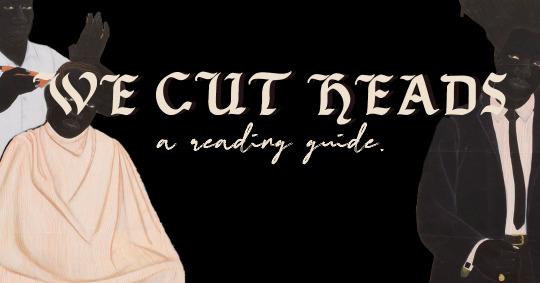

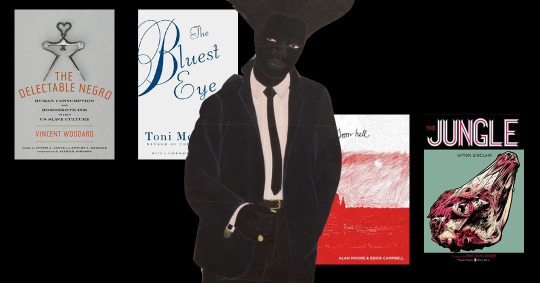
WE CUT HEADS, a reading guide to yah yah's sweeney todd retelling
Some books I've read/will be reading to help me write We Cut Heads! I definitely expect this this will grow, but these are the ones on my mind right now. The ones I've read already are italicized!
THOSE BONES ARE NOT MY CHILD by Toni Cade Bambara
WE REAL COOL: BLACK MEN AND MASCULINTY by bell hooks
BLACK SKIN, WHITE MASKS by Franz Fanon
AFROPESSIMISM by Frank B. Wilderson III
TENDER IS THE FLESH by Agustina Bazterrica
NO LONGER HUMAN by Osamu Dazai
MACBETH by William Shakespeare
SONG OF SOLOMON by Toni Morrison
THE DELECTABLE NEGRO: HUMAN CONSUMPTION AND HOMO-EROTICISM WITHIN U.S. SLAVE CULTURE by Vincent Woodard
THE BLUEST EYE by Toni Morrison
FROM HELL by Alan Moore, Eddie Campbell
THE JUNGLE by Upton Sinclair
#🦢#we cut heads#wip; we cut heads#i wanna do a film version for this too b/c like. the movies...the MOVIES.
232 notes
·
View notes
Text
The children crying from fatigue. The students singing off-key, ragged. The elders on the ground massaging knots in their legs. And Velma clenching her thighs tight, aware that a syrupy clot was oozing down her left leg and she needed to see about herself.
Exhausted, she was squinting through the dust and grit of her lashes when the limousines pulled up, eye-stinging shiny, black, sleek. And the door opened and the cool blue of the air-conditioned interior billowed out into the yellow and rust red of evening. Her throat was splintered wood. Then the shiny black boots stepping onto the parched grass, the knife-creased pants straightening taut, the jacket hanging straight, the blinding white shirt, the sky-blue tie. And the roar went up and the marshals gripped wrists and hoarsely, barely heard, pleaded with the crowd to move back and make way for the speaker.
from The Salt Eaters by Toni Cade Bambara
2 notes
·
View notes